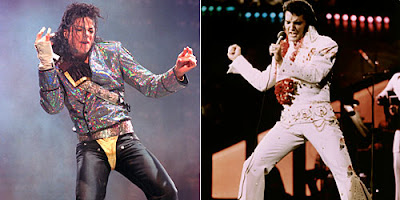 On Aug. 16, 1977, the day Elvis Presley died, folklorist William R. Ferris remembers that in Memphis "it was like the ground began to shake." Within hours, hundreds of pilgrims had descended on Graceland, and the process by which a beloved public personage is transformed into a mythic figure was underway.
On Aug. 16, 1977, the day Elvis Presley died, folklorist William R. Ferris remembers that in Memphis "it was like the ground began to shake." Within hours, hundreds of pilgrims had descended on Graceland, and the process by which a beloved public personage is transformed into a mythic figure was underway.But which Elvis would be mythologized, and whose legacy would be preserved? The youthful rock rebel or the Las Vegas glitter god? The sultry crooner who gyrated his way into a nation's (and eventually the world's) consciousness, or the sadly diminished man who rasped his way through his final hit single?
The struggle over who gets to control a pop cultural or historical figure's legacy and shape his or her predominant image is a shifting, elaborate progression involving the family and friends of the deceased, public relations managers, fans, journalists and, today, legions of bloggers. Over time, it also may be influenced by museum directors, filmmakers, scholars, biographers, publishers, copyright lawyers and politicians.
“Each generation can continue to reinvent” larger-than-life figures such as Michael Jackson, left, and Elvis Presley, says one scholar.
No comments:
Post a Comment